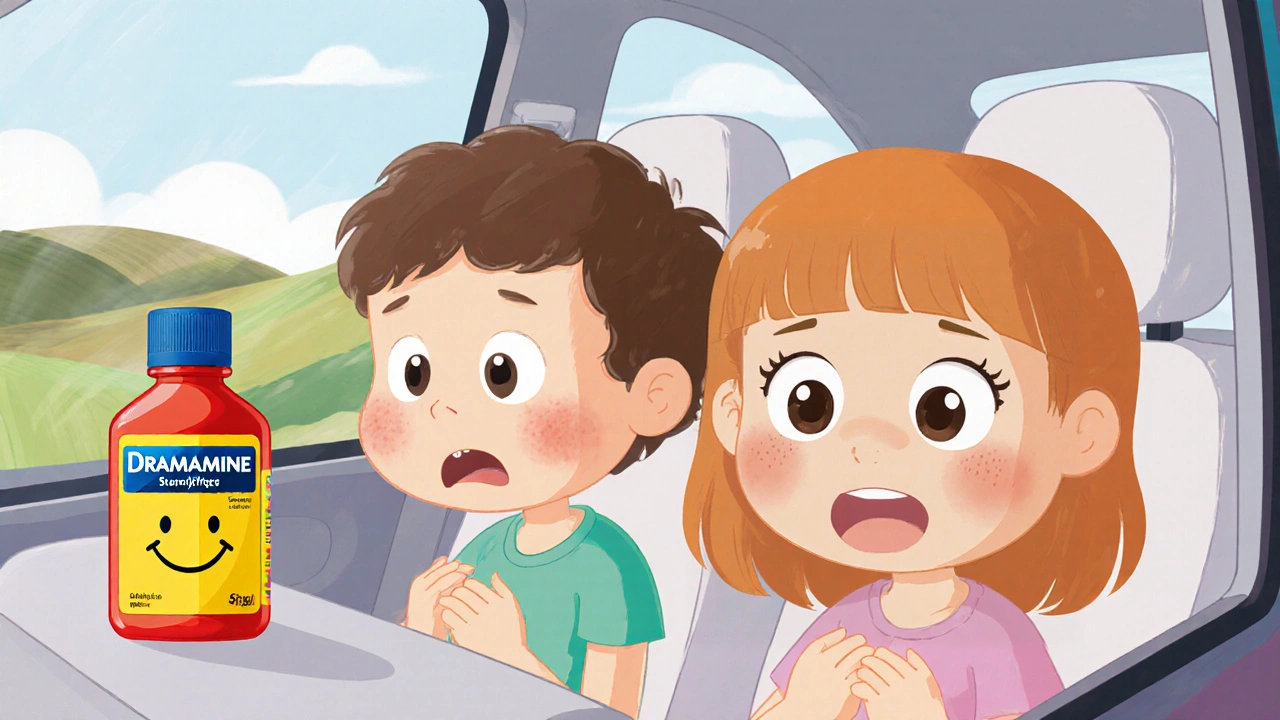Motion Sickness Remedy Selector
Find Your Best Motion Sickness Remedy
Answer these questions to get personalized recommendations for your trip.
When it comes to battling motion sickness, Dramamine (Dimenhydrinate) is a first‑generation antihistamine that blocks histamine receptors in the brain to reduce nausea, vomiting, and the feeling of spinning. It’s been on pharmacy shelves for decades, but a wave of newer or more natural options has us asking: is it still the go‑to choice?
Key Takeaways
- Dramamine works quickly but often causes drowsiness.
- Meclizine offers similar efficacy with less sedation for many users.
- Scopolamine patches provide long‑lasting relief, perfect for multi‑hour trips.
- Natural ginger can ease mild nausea without prescription drugs.
- Choosing the right option depends on onset speed, duration, side‑effect tolerance, and travel context.
How Dramamine (Dimenhydrinate) Works
Dramamine belongs to the antihistamine class, specifically blocking H1 receptors in the vestibular system. By reducing the brain’s response to motion signals, it lessens the mismatch between visual input and inner‑ear balance cues that triggers nausea. Typical adult dosage is 50mg every 4-6hours, not exceeding 400mg per day. The drug starts acting within 30minutes, peaks at about an hour, and lasts roughly 4-6hours.
Side effects are the main complaint: drowsiness, dry mouth, blurred vision, and, in rare cases, confusion-especially in older adults. Because it crosses the blood‑brain barrier, it also carries a mild anticholinergic load, which some people find uncomfortable.
What to Compare: Decision Criteria
Before diving into alternatives, lay out the factors that matter most for you:
- Onset speed - How fast the medicine starts working.
- Duration of relief - Hours of effectiveness per dose.
- Side‑effect profile - Sedation, dry mouth, visual disturbances, etc.
- Drug interactions - Especially with alcohol, sedatives, or chronic meds.
- Cost and availability - Over‑the‑counter price vs prescription.
- Special use cases - Kids, pregnant women, or people with certain health conditions.
These criteria will guide the comparison of each alternative below.
Meclizine (Bonine, Antivert)
Meclizine is a second‑generation antihistamine that also blocks H1 receptors but does so with far less penetration into the central nervous system. Typical dosing for adults is 25mg once daily, with effects lasting up to 24hours. Onset is a bit slower-about 1hour-but the extended duration means you often need only one pill for a long road trip or cruise.
Pros:
- Much lower sedation risk compared with Dramamine.
- Longer duration reduces the need for repeat dosing.
- Effective for both motion sickness and vertigo caused by inner‑ear disorders.
Cons:
- May cause mild dry mouth or mild drowsiness in sensitive individuals.
- Not recommended for children under 12 without physician guidance.
Cyclizine (Marezine)
Cyclizine is another first‑generation antihistamine that sits between Dramamine and Meclizine in terms of sedation. Adults typically take 50mg 30minutes before travel, and the effect can last 4-6hours.
Key points:
- Onset is rapid-about 15‑30minutes.
- Side‑effects include drowsiness, but many users report feeling “alert but calm.”
- Less commonly stocked in U.S. pharmacies, but available online and in some travel clinics.

Scopolamine Patch (Transderm Scop)
Scopolamine is a potent anticholinergic delivered via a behind‑the‑ear patch. One patch (1.5mg) is applied a few hours before travel and provides up to 72hours of relief.
Why it shines:
- Exceptional duration-ideal for multi‑day cruises or long flights.
- Minimal systemic sedation; most users stay alert.
- Effective for severe motion sickness that doesn’t respond to antihistamines.
Watch out for:
- Potential side effects include dry mouth, blurred vision, and, rarely, confusion-especially in older adults.
- Prescription‑only in many countries; price is higher than OTC pills.
Diphenhydramine (Benadryl)
Often known as an allergy reliever, diphenhydramine also works as an antihistamine for motion sickness. A typical adult dose is 25-50mg 30minutes before travel, lasting 4-6hours.
Pros:
- Readily available worldwide.
- Strong anti‑nausea effect.
Cons:
- One of the most sedating OTC antihistamines-many users feel groggy.
- Anticholinergic side effects (dry mouth, constipation) are more pronounced.
Ginger (Zingiber officinale)
Ginger isn’t a drug, but dozens of studies show it can reduce mild to moderate nausea. Common forms include 1g of powdered ginger capsules or 250ml of ginger tea taken 30minutes before motion exposure.
Advantages:
- Natural, no prescription needed.
- Minimal side effects-usually just mild heartburn.
- Can be combined with a low‑dose antihistamine for added relief.
Limitations:
- Effectiveness varies; not as strong as prescription options for severe cases.
- May interact with blood‑thinners if taken in large amounts.
Side‑Effect & Interaction Quick‑Check
Below is a concise matrix that helps you match your health profile with the safest choice.
| Medication | Onset | Duration | Sedation | Key Interactions | Typical Cost (US) - OTC/Prescription |
|---|---|---|---|---|---|
| Dramamine (Dimenhydrinate) | 30min | 4‑6h | High | Alcohol, CNS depressants, MAO‑I | $5-7/N/A |
| Meclizine | 1h | Up to 24h | Low‑moderate | Alcohol, sedatives | $8-12/N/A |
| Cyclizine | 15‑30min | 4‑6h | Moderate | Alcohol, CNS depressants | $6-9/N/A |
| Scopolamine Patch | 2-4h (pre‑application) | 72h | Low | Anticholinergic drugs, glaucoma | $30-45/Prescription |
| Diphenhydramine (Benadryl) | 30min | 4‑6h | Very High | Alcohol, CNS depressants, MAO‑I | $4-6/N/A |
| Ginger (natural) | 30min | 2‑4h | None | Blood‑thinners (high doses) | $3-5/N/A |

Choosing the Right Option for Your Situation
Below are common travel scenarios and the best‑fit medication.
- Short car ride (1‑2hours): Dramamine or diphenhydramine works fast, but if you can’t afford drowsiness, try cyclizine.
- Long flight or cruise (8‑12hours): Meclizine’s 24‑hour coverage means a single dose. If you’re prone to severe symptoms, the scopolamine patch is unbeatable.
- Family trip with kids: Many pediatric formularies recommend meclizine (with doctor’s OK) or a ginger chew for mild cases. Avoid strong sedatives for children.
- Pregnant travelers: Consult a physician, but low‑dose ginger is often considered safe; many doctors advise against antihistamines unless needed.
- Older adults with glaucoma or prostate issues: Stay clear of scopolamine and high‑dose antihistamines; meclizine or a ginger supplement is gentler.
Practical Tips for Safe Use
- Start with the lowest effective dose. If 25mg of meclizine works, there’s no need to double up.
- Take the medication **before** motion begins-most antihistamines need time to hit the bloodstream.
- Avoid alcohol and other sedatives while on any antihistamine; the combo can amplify drowsiness.
- Stay hydrated, but don’t over‑drink caffeine, which can worsen nausea.
- If you experience severe side effects (blurred vision, confusion, rapid heart rate), stop the drug and seek medical help.
Bottom Line: Is Dramamine Still Worth It?
If you need a cheap, fast‑acting option and don’t mind feeling a bit sleepy, Dramamine remains a solid pick. However, for most travelers a second‑generation antihistamine like meclizine offers comparable relief with far less sedation, and the scopolamine patch tops the list for multi‑day journeys. Natural ginger can be a handy backup for light‑to‑moderate motion sickness, especially when you want to avoid pills altogether.
Ultimately, match the drug’s profile to your travel length, sensitivity to drowsiness, and any existing health conditions. A little planning now saves you from seasick misery later.
Frequently Asked Questions
Can I take meclizine and Dramamine together?
It’s generally not recommended because both block the same H1 receptors, which can increase side‑effects like dry mouth and drowsiness without adding extra benefit. Talk to a pharmacist if you think you need stronger relief.
Is the scopolamine patch safe for children?
Scopolamine is prescription‑only for children under 12 in most countries. The anticholinergic effects can be more intense in kids, so pediatricians usually recommend meclizine or ginger instead.
How long before travel should I apply the scopolamine patch?
Apply the patch about 4hours before you expect motion. It takes that time to reach therapeutic levels, and the patch stays effective for up to 72hours.
Will ginger interfere with my blood‑thinner medication?
In high doses ginger can have a mild anticoagulant effect. If you’re on warfarin or another blood‑thinner, keep ginger to culinary amounts or discuss a supplement plan with your doctor.
Why does Dramamine make me so sleepy?
Dimenhydrinate crosses the blood‑brain barrier and blocks histamine in the central nervous system, which also regulates wakefulness. That’s why sedation is a common side effect.


Dramamine works but it’s not the only hero on the seas, you can try ginger or a patch if you hate feeling drowsy
If you’re looking for smoother travel, start with a low dose of meclizine and see how you feel; it often gives the same relief as Dramamine without the heavy sedation. You can take it about an hour before you board, and most people report staying alert and comfortable. Remember to stay hydrated and avoid alcohol, which can amplify any side effects.
Ah, the eternal battle between synthetic pills and nature’s whisper – what does it truly mean to conquer motion’s cruel dance? We stand on a ship of paradox, clutching a tiny tablet while the ocean mocks our feeble attempts at control. Dramamine, that venerable first‑generation antihistamine, has guided countless sailors through tempestuous tides, yet its sedative veil drifts us into a fog of lethargy. One might argue that sedation is a small price for peace, but does the price not rise when the mind is dulled? In the shadows of the pharmacy shelf, newer agents emerge, promising clarity, longevity, and a promise that the world will not spin. Meclizine, with its calmer demeanor, whispers of twenty‑four‑hour guardianship, a silent sentinel against nausea. The scopolamine patch, a marvel of transdermal delivery, clings behind the ear like a secret ally, delivering three days of steadfast relief. Ginger, the humble root, sings a different song – one of ancient wisdom, mild efficacy, and the reassurance of a natural remedy. Yet, ginger’s gentle touch may falter when the seas turn savage, leaving the traveler adrift in a churn of bile. Consider also the pharmacodynamics: Dimenhydrinate floods the H1 receptors, crossing the blood‑brain barrier, and in doing so, steals a fragment of our wakefulness. Meanwhile, cyclizine balances on a razor’s edge, offering rapid onset with moderate drowsiness, a compromise that few truly crave. The choice, dear traveler, is not merely a medical decision but an echo of our values: convenience versus control, tradition versus innovation. Let us not forget the cost, for a patch may drain the wallet as fiercely as a storm lashes the hull. And the side‑effects – dry mouth, blurred vision, the dreaded confusion – haunt the elderly like a phantom. Ultimately, the ocean does not care which pill you swallow; it cares only that you find steadiness within. So weigh the options, respect your body, and set sail with confidence, for the tide of nausea will bow before a well‑chosen ally.
Esteemed readers, the evidence presented herein underscores the virtue of selecting a medication that aligns not only with efficacy but also with personal tolerance for sedation. It is incumbent upon each traveler to evaluate the comparative data, to contemplate the duration of their journey, and to choose with discernment. By adhering to these principles, one may embark upon their voyage with confidence and composure.
Sounds good, I agree that meclizine is a solid pick for long trips.
Our own pharmacists know that cheap American Dramamine is fine but you’ll find the British market pushes expensive patches that don’t even work as well, so stick with what we have.
If you’re still using Dramamine you’re basically stuck in the past.
I hear you, the struggle with motion sickness feels like a storm inside, and it’s okay to experiment – maybe a ginger tea before the flight or a low‑dose meclizine could calm the seas inside you 🙂.
Behind the polished brochures and glossy ads lies a secret cabal of pharma giants, whispering sweet promises of relief while hiding the true cost – a subtle dependency that keeps us forever buying their concoctions. They weave narratives of “the best” and “the most effective” to keep us chained to their supply chain, all the while the real answer may be a humble root or a mindful breathing technique that they refuse to fund. Beware the illusion of the patch; it is but a gilded leash designed to monetize your fear of motion.
While the conspiratorial tone is noted, one must acknowledge that the comparative studies on ginger versus antihistamines are well‑documented in peer‑reviewed literature, demonstrating modest efficacy without the adverse effect profile of synthetic agents; thus, the claim of a grand pharmaceutical plot lacks empirical support.